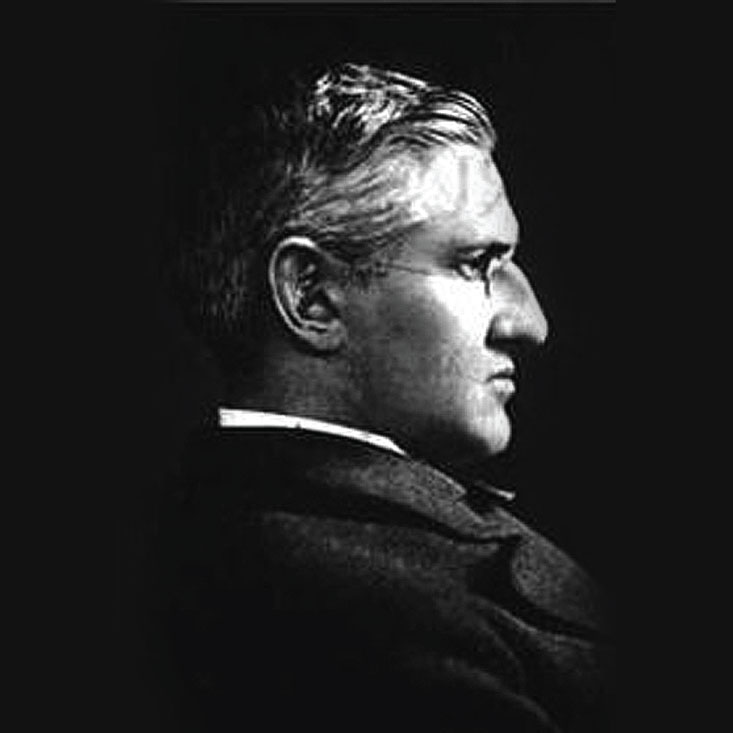Horatio Spafford
October 20, 1828 - October 16, 1888
Lawyer and Author of "It Is Well With My Soul"
Lawyer and Author of "It Is Well With My Soul"
From Chicago, Illinois
Served in Chicago, Illinois and Jerusalem, Israel
Affiliation: Presbyterian
"When peace like a river, attendeth my way, When sorrows like sea billows roll; Whatever my lot, Thou hast taught me to know, It is well, it is well, with my soul."
Horatio Spafford’s name may not be widely known, but the hymn he composed in the depths of personal grief has resonated across generations. Born in Troy, New York, in 1828, Spafford built a successful life in Chicago as a lawyer and real estate investor. Yet his true legacy was not in wealth or profession but in a singular expression of faith forged through profound loss. “It Is Well With My Soul,” the hymn for which he is best remembered, was not merely the product of poetic inspiration but a declaration of resilience in the face of nearly unimaginable sorrow.
Spafford’s life was punctuated by tragedy. In 1871, the Great Chicago Fire consumed much of the city, reducing homes and businesses to smoldering ruins. Among the many financial casualties was Spafford himself, who lost vast real estate holdings in the disaster. As a prominent lawyer and investor, he had built a considerable fortune, but in a matter of days, much of it was gone. Though he worked to rebuild, the financial strain added an immense burden to his otherwise stable life. Yet it was only a prelude to the far greater sorrow that awaited him.
Two years later, seeking a reprieve from mounting stress and hardship, Spafford planned a trip to Europe for his family. The journey was meant to be a time of spiritual and emotional renewal, as well as an opportunity to support his close friend, the evangelist D.L. Moody, in his revival efforts in England. However, unforeseen business matters forced Spafford to remain behind, and he made the fateful decision to send his wife, Anna, and their four young daughters—Annie, Maggie, Bessie, and Tanetta—ahead on the steamer Ville du Havre, with plans to join them shortly after.
Tragically, the voyage was destined for calamity. In the dark hours of November 22, 1873, while crossing the Atlantic, the Ville du Havre collided with the iron-hulled Scottish vessel Loch Earn. The damage was catastrophic. Within twelve minutes, the steamer was swallowed by the sea, plunging hundreds of passengers into the freezing waters. Anna Spafford was among the few who survived, found clinging to debris before being rescued. Their four daughters, however, perished in the wreckage, lost to the merciless ocean.
When Spafford received Anna’s telegram from Wales, it contained only the haunting words: “Saved alone. What shall I do?” In that moment, his world was irrevocably shattered. The weight of grief must have been unbearable—his fortune largely gone, his daughters lost in a single stroke. Yet, rather than turning away from faith, Spafford set sail across the Atlantic to reunite with his grieving wife. It was during this journey, as he passed the approximate location where the Ville du Havre had sunk, that he was moved to pen the words of It Is Well With My Soul.
When Spafford set sail to reunite with his grieving wife, his ship passed over the location where his daughters had perished. It was there, in the silence of the sea, that he penned the words that would become the enduring hymn:
“When peace like a river attendeth my way,
When sorrows like sea billows roll;
Whatever my lot, Thou hast taught me to say,
It is well, it is well with my soul.”
It was a statement of faith as defiant as it was devotional. Rather than turning away from God in bitterness, Spafford reaffirmed his belief in divine sovereignty, declaring that no earthly sorrow could sever his soul from its ultimate hope. In an era when suffering was a deeply personal yet widely shared experience through war, disease, or the high mortality rates of the time, this hymn became a source of solace for countless believers. It was a theological pronouncement: suffering was real, but so was the peace of God.
Spafford’s life of faith extended beyond this singular moment of hymnody. A Presbyterian elder in Chicago, he was closely tied to the influential evangelist D.L. Moody, whose revivalist preaching shaped the contours of American evangelicalism in the late 19th century. The Spaffords supported Moody’s urban ministries, which sought to bring the gospel to a rapidly industrializing and often spiritually destitute city.
Yet Spafford’s faith did not remain confined to the American religious landscape. In the later years of his life, he and Anna relocated to Jerusalem, where they founded the American Colony. This Christian community dedicated itself to humanitarian efforts, providing aid to the sick and the impoverished, regardless of creed or background. At a time when religious divisions ran deep in the Holy Land, the Spaffords’ work stood as a testament to a faith that transcended sectarianism and sought to embody Christ’s teachings through service. The colony became a refuge for those in need, offering medical care, food, and shelter to Jews, Muslims, and Christians alike. The Spaffords and their followers lived communally, embracing a life of simplicity and self-sacrifice, believing that their suffering had drawn them closer to a divine purpose. During times of war and famine, the American Colony played a crucial role in alleviating hardship, earning the trust of local communities. Their mission, though unconventional, reflected a faith not merely spoken in words, but lived out through tireless acts of mercy and compassion.
Though his life was marked by personal devastation, Spafford’s legacy is one of perseverance. It would be easy to define his faith solely by the hymn he wrote in grief, but his response to tragedy, turning sorrow into service, demonstrates a deeper resilience. His story, and that of his wife Anna, is one of remarkable resolve: rather than retreating into despair, they pressed forward in ministry, bearing witness to a faith that refused to be extinguished by suffering. Over a century later, “It Is Well With My Soul” remains a defining hymn of Christian endurance, its words echoing not just in churches but in the hearts of all who have known grief and sought solace in a loving Savior whose saving grace extends beyond this earthly realm.
For further reading:
1. Jane Fletcher Geniesse’s book, American Priestess: The Extraordinary Story of Anna Spafford and the American Colony in Jerusalem
2. “American Colony in Jerusalem Collection: Part I: Diary of Horatio Gates Spafford,” (LOC)




